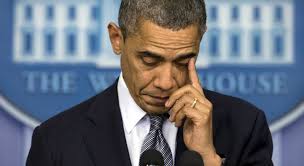Few seem to have noticed that President Barack Obama has scattered to the winds bipartisan Israeli reservations regarding establishing a Palestinian state.
In a recent interview on Israel Television Channel 2, President Obama was quizzed on his public rejection of Israeli Prime Minister Benjamin Netanyahu’s re-election statement that he continues to adhere to his 2009 in-principle acceptance of a Palestinian state, which actually contained several conditions –– Palestinian recognition of Israel as a Jewish state; acceptance of a demilitarized Palestinian state, defensible borders for Israel and a united Jerusalem.
In a quite extraordinary repudiation of an ally’s statement of clarification, President Obama told his Israeli interviewer, Ilana Dayan, “Well, I think that when he spoke right before the election, he was fairly unequivocal in saying that it wouldn’t happen during his prime ministership. As long as he was Prime Minister, there wouldn’t be two states. I think subsequently, his statements have suggested that there is the possibility of a Palestinian state, but it has so many caveats, so many conditions, that it is not realistic to think that those conditions would be met any time in the near future. And so the danger here is that Israel as a whole loses credibility.”
In short, President Obama dismissed Mr. Netanyahu’s reiteration of these conditions as though they were new sticking points and rubbished them as so many unrealistic demands and discreditable obstacles.
This is but the latest link in a chain of presidential decisions that have been drastically harmful to Israel.
Thus, instead of leaving vital matters of Israeli security to negotiations, President Obama in May 2011 publicly insisted on what he calls the “1967 borders” –– actually the 1949 armistice lines, which are not borders but rather the frontiers at which the first Arab/Israeli war ended –– with minor, agreed land swaps, as constituting the baseline of future Palestinian statehood.
Inasmuch as the “1967 borders” and “agreed swaps” would mean only a marginally divergent boundary, this is a distinction with barely a difference, one that effectively discards U.N. Security Council Resolution 242’s insistence on secure and recognized borders for Israel, upon which the positions of successive U.S. administrations were predicated.
President Obama’s position would deprive Israel of the strategically vital buffer zone of the Jordan Valley, whose retention successive Israeli governments have regarded as vital to Israeli defense. (The late Yitzhak Rabin said as much in his last speech to the Knesset in October 1995). His policy would also deprive Israel of scope for future municipal development of Jerusalem.
The same month, President Obama also offered the unprecedented suggestion that issues of “territory and security” should be agreed upon first, before proceeding to negotiations on all other matters, including Jerusalem, the Palestinian refuges and their millions of descendants. No previous president ever said that Israel must offer major concessions before these vital matters are even addressed.
Upholding Israel’s basic security would mean repudiating the repatriation of the Palestinian refugees of the 1948-9 war and their descendants in Israel, but President Obama hasn’t. To the contrary, he has supported the so-called Saudi peace plan, which demands not only a return to the 1949 armistice lines, but also the return of all refugees and their descendants to Israel.
It would also mean refusing to permit the Nuclear Non-Proliferation Treaty (NPT) Review Conference statement from singling out Israel and insisting it join the NPT. Bill Clinton in 2000 and George W. Bush in 2005 refused. Barack Obama in 2010 did not.
If President Obama was genuine about holding Mahmoud Abbas’ Palestinian Authority (PA) accountable for terrorism, he would demand the disbanding of Fatah’s own Al Aqsa Martyrs Brigades, a U.S. recognized terrorist group. He would have demanded the abrogation of the PA’s unity agreement when it signed it with Hamas –– a violation of the Oslo Accords –– as a precondition of any future talks and continued U.S. aid. He has done neither.
The ramifications of this indifference to Israeli security are not merely theoretical but practical. Thus, when Israel found itself embroiled in a war last year with Hamas in Gaza, President Obama, while publicly supporting Israel’s war aims of ending rocket fire from Gaza and destroying Hamas’ terror tunnels, quietly leaned on Israel to agree to the Hamas-compliant Qatari ceasefire proposal. When Israel didn’t, he abruptly withheld resupply of Hellfire missiles and imposed an unnecessary ban on flights to Ben Gurion Airport.
Neither were the ramifications of President Obama’s indifference theoretical when, in February 2012, Administration officials publicized Israeli preparations to deal militarily with Iran, including Israeli use of Azerbaijan airfields; nor, in recent weeks, when the Administration further publicized details of an Israeli espionage mission in Iran.
The record shows that President Obama has little interest in and even less support for Israeli security, something that goes far to explain the recurrent series of ructions between Washington and Jerusalem in recent years.
Morton A. Klein is National President of the Zionist Organization of America (ZOA). Dr. Daniel Mandel is Director of the ZOA’ s Center for Middle East Policy and author of H.V. Evatt & the Creation of Israel (Routledge, London, 2004).
